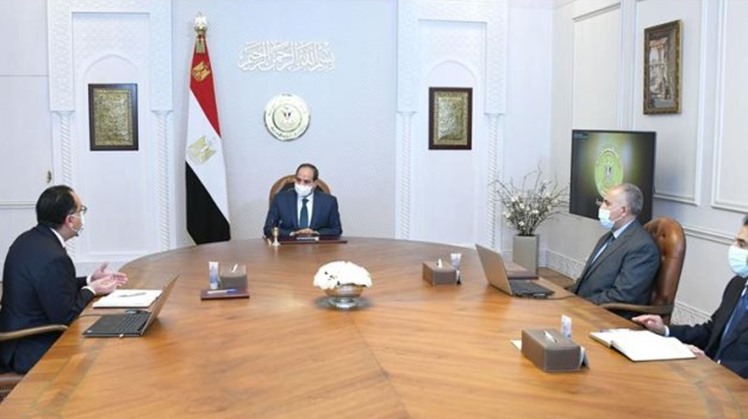CAIRO – 19 April 2022: Egypt's President Abdel Fattah El-Sisi held a meeting on Monday with Prime Minister Mostafa Madbouly to follow up on irrigation projects nationwide in the presence of Minister of Water Resources and Irrigation Mohamed Abdel Atty.
During the meeting, Sisi ordered to continue expanding the application and dissemination of the modern irrigation system for agricultural land nationwide, due to the speed of its implementation and water rationalization.
The meeting focused on Egypt’s water situation, as well as water needs and their provision for agricultural projects and drinking water. It also tackled work progress in a number of projects, particularly projects to strengthen water installations as well as projects to protect and enhance beaches.
“This is a key component to the state’s strategy to rationalize water consumption and raise the efficiency of irrigation water management, mainly the national project to line canals and raise the capacity of secondary water canals,” Rady said.
The Minister of Irrigation offered an overview of efforts to shift towards modern irrigation systems as well as developments in the national projects for canal lining across the republic at a length of 20-thousand km. He also reviewed efforts for the sound management of groundwater use, notably through the ongoing modernization of the database of underground wells to monitor changes in the level and quality of underground water.
The President also gave directives to work on achieving rational management and safe use of groundwater in Egypt, in order to ensure the availability of this non-renewable water resource for future generations.
This is while following up and observing groundwater reserves, as well as developing a plan to explore underground reservoirs.
Egypt has five renewable and non-renewable aquifers (Moghra, the Carbonate aquifer, Nubian Sandstone aquifer, Toshka aquifer, and an aquifer in Tor Sinai). The Nubian Sandstone Aquifer (NSA) is the largest aquifer in the world with about 2.2 million square meters and is shared between Egypt, Libya, Sudan, and Chad. In 2013, the four countries signed a deal on managing and running the aquifer to benefit from it in the Vienna-based International Atomic Energy Agency (IAEA)
Nubian Sandstone aquifer saw a decline in its level, due to the Libyan man-made river that was constructed during late Libyan leader Muammar al-Gaddafi's era.
The Spokesman added that the Minister of Irrigation presented the ministry's efforts in the field of digital transformation and the situation pertinent to digital applications in water management. This is within the framework of the "Egypt 2030" vision that includes shifting to digital transformation in the performance of state agencies and institutions, Rady continued.
Cooperation efforts with brotherly African countries in the field of irrigation, particularly Nile Basin countries, were also discussed, as Egypt is keen, on the bilateral level, to provide them with technical support in this regard. This is particularly for digging groundwater wells, developing waterways, equipping specialized centers for rain forecasting, rehabilitating ports, and training many local technical cadres. In the same context, the progress made in implementing the project to link Lake Victoria with the Mediterranean was also reviewed, taking into account what this project would achieve in terms of maximizing the benefit of river navigation and increasing trade exchange between African countries.
The President directed to strengthen efforts in implementing cooperation projects in the field of irrigation with the Nile Basin countries, in a manner that helps achieve economic integration among them, taking into consideration the potential opportunities of the basin countries, which open up prospects for cooperation, building, and developing joint relations between them.
Abdel-Aty also reviewed preparations for organizing the Fifth Cairo Water Week, which will be held under the auspices of President El-Sisi, under the title "Water at the Heart of Climate Action", within the framework of the state's belief in the importance of water in the issue of climate change, which will be reflected in Egypt's hosting of the World Climate Summit COP27 this year.
 Tue, Apr. 19, 2022
Tue, Apr. 19, 2022